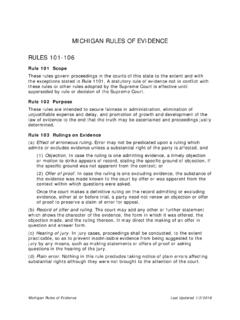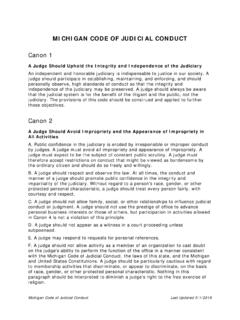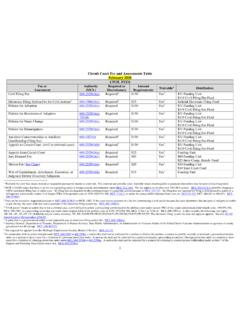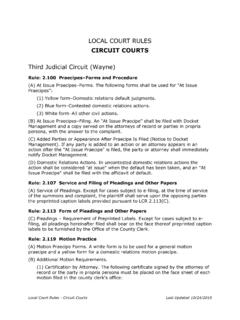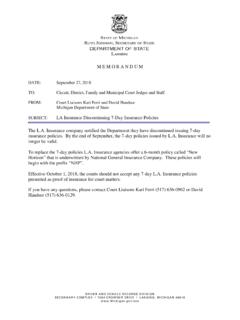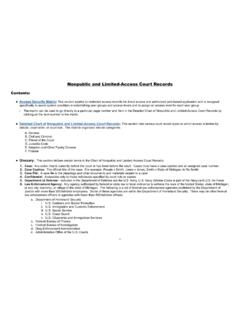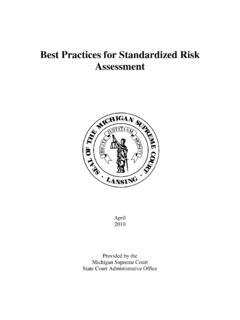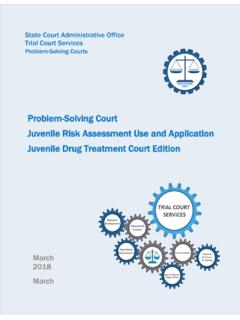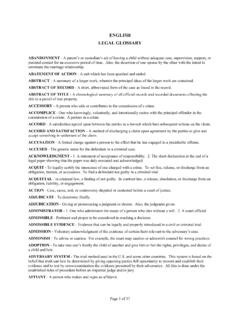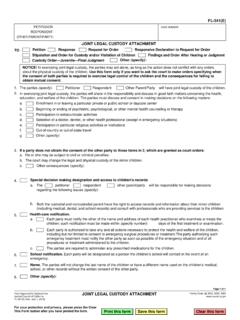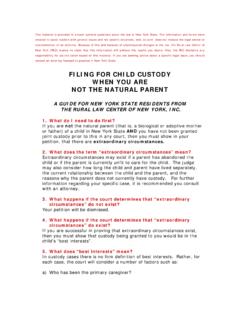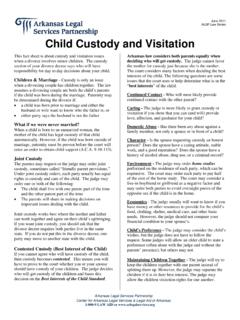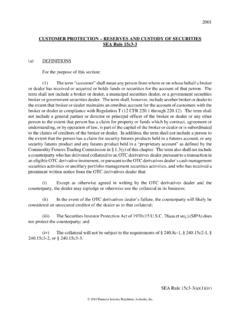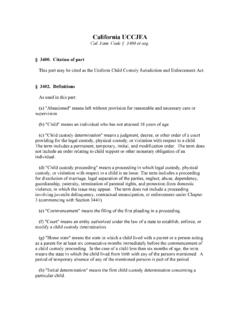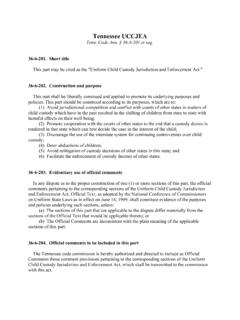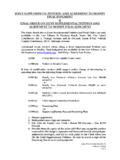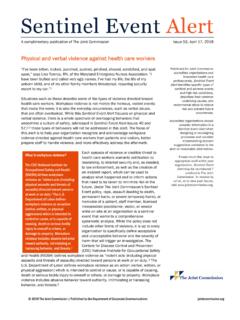Transcription of Michigan Parenting Time Guideline
1 MichiganParentingTimeGuidelineState Court Administrative Office309 N. Washington SquareP. O. Box 30048 Lansing, MI 48909(517) 373-4835 Grant funding provided by theMichigan Family Independence AgencyThe Parenting Time Guideline is supported by the Accessand Visitation Grant, Office of Child Support Enforcement,Department of Health and Human Services. Points of view inthis document are those of the authors and do not necessarilyrepresent the official position or policies of the Department ofHealth and Human Michigan Parenting Time Guideline is funded by a grant from the Michi-gan Family Independence Agency. The State Court Administrative Officethanks the Agency for its generous Parenting Time Guideline was developed by an Advisory Committee com-prised of friend of the court personnel, mental health professionals, Friend ofthe Court Bureau Advisory members and State Court Administrative Officestaff. The recommendations presented in the Parenting Time Guideline repre-sent the committee members professional judgment and they do not consti-tute recommendations from the Michigan Supreme Court and should not beviewed as definitive in all wish to thank the Parenting Time Advisory Committee members for theirparticipation in the development of the Michigan Parenting Time Guideline :Ms.
2 Rose Bammert, Houghton, Baraga and Keweenaw County Friend of the Courtoffice, 12th Circuit CourtMr. Robert Botkins, Ontonagon County Friend of the Court, 32nd Circuit CourtDr. William Brooks, Kalamazoo Psychological AssociatesMs. Lori Clifford, Arenac, Ogemaw and Roscommon County Friend of the Court office,34th Circuit CourtMr. Andy Crisenbery, Jackson County Friend of the Court, 4th Circuit CourtMs. Linda Cunningham, Friend of the Court Bureau Advisory CommitteeMs. Retha Filhart, Midland County Friend of the Court office, 42nd Circuit CourtMr. Emil Joseph, Lapeer County Friend of the Court, 40th Circuit CourtMs. Kim Lem, Kalamazoo Psychological AssociatesMr. David Manville, Wayne County Friend of the Court office, 3rd Circuit CourtMs. Jane McCarron, Oakland County Friend of the Court office, 6th Circuit CourtMr. Edward Messing, St. Clair County Friend of the Court office, 31st Circuit CourtMs. Amy Neubecker, Otsego, Crawford and Kalkaska County Friend of the Court office,46th Circuit CourtMs.
3 Lorraine Randolph, Oakland County Friend of the Court office, 6th Circuit CourtMs. Barb Smyrnios, Kalamazoo County Friend of the Court office, 9th Circuit CourtDr. Roger Wittrup, Friend of the Court Bureau Advisory CommitteeTable of 3 Parenting 7 Joint 11 Supervised Parenting 13 Transitioning from Supervised toUnsupervised Parenting 17 General 19 Special 331 IntroductionThe Michigan Friend of the Court Act requires the State Court AdministrativeOffice, Friend of the Court Bureau, to develop and recommend guidelinesfor conduct, operations, and procedures of the [friend of the court] office andits employees .. MCL (3)(a). In response to this mandate, the Michi-gan Parenting Time Guideline is promulgated for use in the state s friend ofthe court Parenting Time Guideline contains information addressing many of thechallenges associated with establishing and maintaining Parenting time Parenting Time Guideline provides suggestions and recommendations toaddress issues relevant to the three most common Parenting time arrange-ments: Parenting time, supervised Parenting time, and joint custody.
4 TheParenting Time Guideline is intended for use by friend of the court staff andcustodial and non-custodial parents. Although the Parenting Time Guidelineprovides information on numerous subjects, the reader is reminded that theinformation presented is not an exhaustive listing of the myriad of subjectsand issues relevant to Parenting Definition of Parenting TimeMichigan statutes recognize that when parents separate or divorce, theirchild(ren) s best interests are served by continuation of the parent/child rela-tionship. So strong is this recognition that the law establishes a presumptionthat it is in the best interests of a child(ren) to have strong relationships withboth parents. Therefore, Parenting time should be of a frequency, durationand type reasonably calculated to promote a strong relationship between thechild(ren) and the parent. The child(ren) has a right to Parenting time unlessthe court determines on the record by clear and convincing evidence thatparenting time would endanger the child(ren) s physical, mental or emotionalhealth (MCL ).
5 Section 7(1)(b) of the Child Custody Act states: Parenting time of the childby the parent is governed by Section 7a. Section 7a(1) begins with thestatement, Parenting time shall be granted in accordance with the best inter-ests of the child. Case law has established that Section 3, which provides thestatutory definition of best interests of the child , is applicable to parentingtime demonstrate the adverse consequences that can follow when thechild(ren) does not have a relationship with both parents. Other studies dem-onstrate that there is a relationship between the participation of a parent in thelives of his or her child(ren) and the willingness of that parent to providesupport to the child(ren), including direct support in addition to that which iscourt goal of any Parenting time plan should be to ensure that a child(ren) hasa relationship with both parents that, as nearly as possible, encourages con-tinued parental responsibility and promotes continued parental time should not be viewed as a portion of the child(ren) s time allo-cated to a parent, but rather a portion of a parent s time reserved for thechild(ren).
6 To this end, Parenting time plans should offer structure but allowflexibility. For this reason, more structure will be necessary as Parenting timeplans move across the spectrum from a shared Parenting time arrangement toa supervised Parenting time plan. In between are Parenting time plans thatoffer some flexibility but contain enough structure to remove obstacles thatcould interfere with the success of the Parenting time order to determine the length, frequency and type of Parenting time, thecourt considers several factors (MCL ). existence of any special circumstances or needs of the the child is a nursing child less than 6 months of age, or lessthan 1 year of age if the child receives substantial nutrition reasonable likelihood of abuse or neglect of the child duringparenting reasonable likelihood of abuse of a parent resulting from the exer-cise of Parenting inconvenience to, and burdensome impact or effect on, the child oftraveling to and from the Parenting a parent can reasonably be expected to exercise Parenting timein accordance with the court the parent has frequently failed to exercise reasonable threatened or actual detention of the child with the intent to retainor conceal the child from the other parent or from a third person whohas legal custody.
7 A custodial parent s temporary residence with the childin a domestic violence shelter shall not be construed as evidence of thecustodial parent s intent to retain or conceal the child from the other relevant a more in depth definition and explanation of the factors, please consultthe Michigan Parenting Time and Change of Domicile Evaluation Model,October 1998 emotional challenges and unresolved issues between separated parentsmay interfere with shared Parenting . Children may find themselves torn be-tween their desire to have a relationship with both parents and their desire toavoid the negative feelings associated with their parents relationship. Par-ents may place their child(ren) in awkward positions by using the child(ren)to deliver messages, or to act as a spy to report information back to the parents may also use Parenting time to exert control over the other par-ent or to express anger and dissatisfaction about the other parent to the detri-ment of a child(ren) s more difficulties the parents have with the dissolution of their own rela-tionship, the less discretion they may be capable of exercising.
8 A structuredparenting time schedule may assist parents who work poorly together. Struc-ture will also help the child(ren) by providing a stable routine. When theparents work well together, a less structured schedule may be sufficient. When5the child(ren) grow older, the same developmental stages that cause thechild(ren) in intact families to spend less time with their parents are presentfor those families that have been reorganized by the parents separation. Thiswill require more flexibility in the Parenting time schedule. Structuringparenting time to meet the goal of stability will eventually allow the parties totreat their child(ren) s time with the other parent as a separate component ofthe parent/child order to provide the necessary structure for Parenting time to occur, parentingtime orders are required to be granted in specific terms if requested by a partyand may contain any reasonable terms or conditions (MCL (8)).
9 Ex-amples of such terms and conditions of the responsibility to transport the child(ren). of the cost of transporting the child(ren). on the presence of third persons during Parenting that the child(ren) be ready for Parenting time at aspecific that the parent arrive for Parenting time and return thechild(ren) from Parenting time at specific that Parenting time occur in the presence of a third personor that a party post a bond to assure compliance with aparenting time of reasonable notice when Parenting time will not other reasonable condition determined to be appropriate in the par-ticular Guideline will examine three types of Parenting plans Parenting time,supervised Parenting time and joint custody. Common themes concerning theseplans will be examined in the section entitled General Provisions, and specialissues that may impact Parenting time will be examined in the section entitledSpecial TimeParenting time is time set aside by court order for a parent and child(ren) tospend together in the absence of a contrary agreement by the parties.
10 Michi-gan law recognizes that it is in the best interests of the child(ren) that parentingtime occur in a frequency, duration, and type reasonably calculated to pro-mote a strong relationship between the child(ren) and the parent. To this end, Parenting time should be on a regular schedule with specific consistent start-ing and ending times for the ease of the parties and child(ren) in planningtheir schedules. Ideally, orders should provide for changing needs of thechild(ren) and changes in the parties schedules. Parties should adopt parentingtime schedules that are flexible and expansive while keeping in mind theirchild(ren) s need for certainty and stability. When the parties adopt a sched-ule, the courts normally will not interfere with the schedule unless there areexceptional sample schedule presented in this Guideline is based upon the most com-monly used schedules across the state. Specific days and periods of time havebeen chosen for ease of use.
